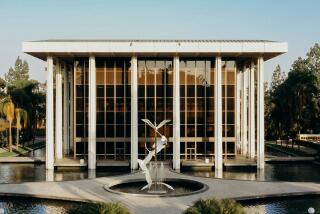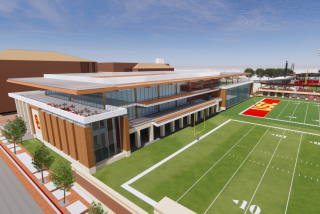University Ups the Ante for Concert Rights
- Share via
SAN DIEGO — Concert promoters vying for exclusive booking rights to San Diego State University’s Open Air Theater are finding the stakes to be higher and the jackpot bigger than when the contract last came up for bid two years ago.
Besides the usual requirement for a minimum annual rent guarantee, the request for proposals that the school’s Associated Students sent out two weeks ago asks promoters to promise at least $4 million in “capital contributions” toward construction of a 12,000-seat on-campus arena.
In return, the exclusive operating permit for the Open Air Theater would be extended from the previous two years to as many as 18 years, and the winning bidder would also be granted a second exclusive permit, for as long as 15 years, to produce concerts at the proposed Student Activity Center, scheduled to open in January, 1992.
Last February, SDSU students voted to build a 10,000-seat center, financing the cost of construction--estimated at $30 million--through higher student union fees. The center will also be used as an athletic arena.
“After talking it over some more, we decided 12,000 seats would be a lot nicer,” said Bill Erickson, vice president for business affairs. “But we couldn’t see how we could get the additional money from the students, so we had to look somewhere else.
“And since at the very same time the Open Air Theater exclusive was coming up, we decided to couple the two together.”
According to the request for proposals, “the pending addition of the center will add a sizeable year-round venue to the San Diego entertainment scene that promises to combine state of-the-art acoustics with the latest technological requirements necessary for producing contemporary artists while maximizing audience enjoyment.”
The $4 million chipped in by the promoter who gets the contract will be used “for the purpose of increasing the seating capacity of the arena by 2,000 to at least 12,000.” The successful promoter will be required to place half that amount in escrow at the time the agreement is signed and come up with the balance within 12 months.
The new center will occupy the site of the present Aztec Bowl and will be available for as many as 60 concerts per summer. That total, combined with 45 dates available at the Open Air Theater, will mean more than 100 concerts can be staged during the summer.
The deadline for submission of bids is Dec. 19. The decision on a promoter will be made in late December or early January by SDSU President Thomas B. Day, based on advice from an ad hoc Associated Students committee.
Among the 12 promoters asked to submit proposals is Avalon Attractions, which has held the Open Air Theater exclusive rights for the last five years.
Avalon, according to JoEllyn Savage, Associated Students communications director, was consulted early in the fall semester “for input on the feasibility of giving one promoter the exclusive to both facilities, and the question of capital contributions was one of the things that came up.”
This doesn’t sit well with rival promoter Bill Silva, who said Avalon’s participation in the drafting of the proposal request “is like the teacher asking his pet student what questions he thinks should be on the test.”
“Why even have a request for proposals?” Silva said. “The whole question in my mind is, are they really going to consider other proposals, or is this just a smoke screen for appearance’s sake?”
Savage defends Avalon’s involvement.
“We were merely asking them for advice,” Savage said. “We weren’t giving them the inside track on information; it’s not going to give them any kind of advantage.
“Avalon happens to be our current contract holder, so naturally we went to them because they know the business. It would have been bad form to consult with anyone else.”
Moss Jacobs, general manager of Avalon, agrees.
“Everybody’s starting from the same point,” Jacobs said. “The expertise and experience the school has gotten out of their five-year relationship with Avalon merely serves as a basis for a better understanding of how the concert business is run.”
More to Read
The biggest entertainment stories
Get our big stories about Hollywood, film, television, music, arts, culture and more right in your inbox as soon as they publish.
You may occasionally receive promotional content from the Los Angeles Times.










